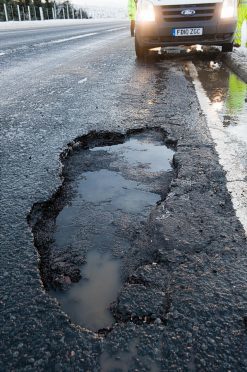Repairs to roads across the Highlands damaged by the harsh winter are to begin thanks to a £1.5million cash injection from Transport Scotland.
Bear Scotland is to advance work on a number of carriageways across the West Coast and Skye which have been weakened as a result of the freeze and thaw.
The A87 between Ard Doch and Luib on the Isle of Skye is estimated to cost £286,000, becoming the second largest repair to be undertaken during these works.
The carriageway is to be fully restructured and is scheduled to commence on March 5.
Councillor John Finlayson for Eilean a’ Cheò has welcomed the news and emphasised these works would help tackle an increasing problem for Skye.
He said: “The state of the roads after the harsh winter is very worrying and even our trunk roads are now in a terrible state.
“It is good to see that Bear are responding to the state of the road in Ard Dorch and I also hope they look at the rest of the trunk road network on Skye too as there are spots that need immediate attention. Being proactive helps improve things before they get really bad.
“I also hope that the weather improves so that the council can get on with repairing the many other roads on Skye that continue to deteriorate.”
Other roads in the north which are scheduled for repair over the coming months include the A82 at Fort William, the A887 at Invermorriston and the A82 just South of Spean, all costing around £500,000 to complete.
Councillor Andrew Baxter for Fort William and Ardnamurchan said: “The A82 is now in a shocking state and the section through Fort William to Torlundy deteriorating further on a day-to-day basis. The work that Bear Scotland has announced can’t come a moment too soon.”
Transport Scotland has provided the £1.5m on top of resurfacing schemes that were already planned for 2018.
Eddie Ross, Bear Scotland’s north west representative, said; “The recent inclement weather has had a huge impact on road surfaces in many places causing them to break up. This programme will help us address the worst areas and we are also reprioritising the works planned for spring to ensure that these tackle the areas of most need.”
